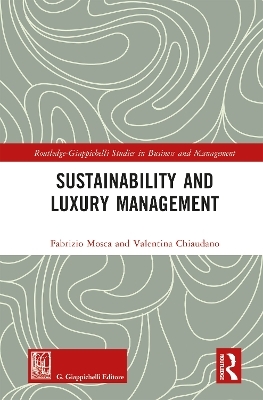
Sustainability and Luxury Management
Seiten
2024
Routledge (Verlag)
978-1-032-84126-7 (ISBN)
Routledge (Verlag)
978-1-032-84126-7 (ISBN)
- Lieferbar (Termin unbekannt)
- Versandkostenfrei
- Auch auf Rechnung
- Artikel merken
Luxury and sustainability appear to be incompatible, however, this book resolves the divergence between them, shedding light on the evolving dynamics within the luxury brand market. Thanks to an in-depth analysis of the definition of luxury, the authors demonstrate that sustainability is aligned with young consumers’ idea of it.
Recently, sustainability has become a focal point for companies across all sizes and sector, and the luxury industry is no exception. This shift reflects a growing awareness of the environmental, social, and community impacts of business activities. However, integrating sustainability into the luxury industry poses unique challenges due to the apparent mismatch between luxury and sustainability. While luxury often connotes indulgence and opulence, sustainability emphasizes altruism, ethical practices, and moderation, seemingly conflicting with traditional luxury values. This book, first attempts to resolve the abovementioned divergence between luxury and sustainability. Thanks to an in-depth analysis of the definition of luxury, the authors demonstrate that sustainability is in line with the young consumers’ idea of luxury. Moreover, leveraging a structured review, the book organizes the scientific production on sustainable luxury in the research area and explains the reasons for matching luxury and sustainability. Then this book also attempts to explain to what extent luxury brand companies are improving their commitment to sustainable actions. In this endeavor, the authors explore the fundamental issues within sustainable luxury and the integration of sustainability into the corporate business model. The explorations also include the companies’ efforts to communicate sustainability both offline and online with a focus on the themes and tools. Finally, this book offers a benchmark by providing the audience with several business cases. The discussion of case studies aims to meet the needs of a wide and varied audience, from university students to CSR managers looking to extract valuable insights and adapt them to their respective business contexts.
Recently, sustainability has become a focal point for companies across all sizes and sector, and the luxury industry is no exception. This shift reflects a growing awareness of the environmental, social, and community impacts of business activities. However, integrating sustainability into the luxury industry poses unique challenges due to the apparent mismatch between luxury and sustainability. While luxury often connotes indulgence and opulence, sustainability emphasizes altruism, ethical practices, and moderation, seemingly conflicting with traditional luxury values. This book, first attempts to resolve the abovementioned divergence between luxury and sustainability. Thanks to an in-depth analysis of the definition of luxury, the authors demonstrate that sustainability is in line with the young consumers’ idea of luxury. Moreover, leveraging a structured review, the book organizes the scientific production on sustainable luxury in the research area and explains the reasons for matching luxury and sustainability. Then this book also attempts to explain to what extent luxury brand companies are improving their commitment to sustainable actions. In this endeavor, the authors explore the fundamental issues within sustainable luxury and the integration of sustainability into the corporate business model. The explorations also include the companies’ efforts to communicate sustainability both offline and online with a focus on the themes and tools. Finally, this book offers a benchmark by providing the audience with several business cases. The discussion of case studies aims to meet the needs of a wide and varied audience, from university students to CSR managers looking to extract valuable insights and adapt them to their respective business contexts.
Fabrizio Mosca is a Full Professor of Corporate, Business Strategy and Marketing at the University of Torino, Italy. Valentina Chiaudano is a research fellow and lecturer in Marketing and Sustainability Management at the University of Turin, Italy.
1. The evolution of luxury: from unnecessary to customer-centric 2. Sustainability and luxury: is there a match? 3. A strategic approach for managing sustainability in the luxury market 4. Social reporting and the impact of CSR practices on luxury companies’ financial performances 5. communicating CSR in the luxury market 6. the best practices for a sustainability approach: case studies from different luxury segments
| Erscheinungsdatum | 18.09.2024 |
|---|---|
| Reihe/Serie | Routledge-Giappichelli Studies in Business and Management |
| Zusatzinfo | 31 Tables, black and white; 29 Line drawings, black and white; 1 Halftones, black and white; 30 Illustrations, black and white |
| Verlagsort | London |
| Sprache | englisch |
| Maße | 156 x 234 mm |
| Gewicht | 560 g |
| Themenwelt | Sozialwissenschaften ► Soziologie ► Spezielle Soziologien |
| Wirtschaft ► Betriebswirtschaft / Management ► Marketing / Vertrieb | |
| Wirtschaft ► Volkswirtschaftslehre | |
| ISBN-10 | 1-032-84126-5 / 1032841265 |
| ISBN-13 | 978-1-032-84126-7 / 9781032841267 |
| Zustand | Neuware |
| Haben Sie eine Frage zum Produkt? |
Mehr entdecken
aus dem Bereich
aus dem Bereich
eine Einführung
Buch | Softcover (2024)
De Gruyter Oldenbourg (Verlag)
CHF 41,90


